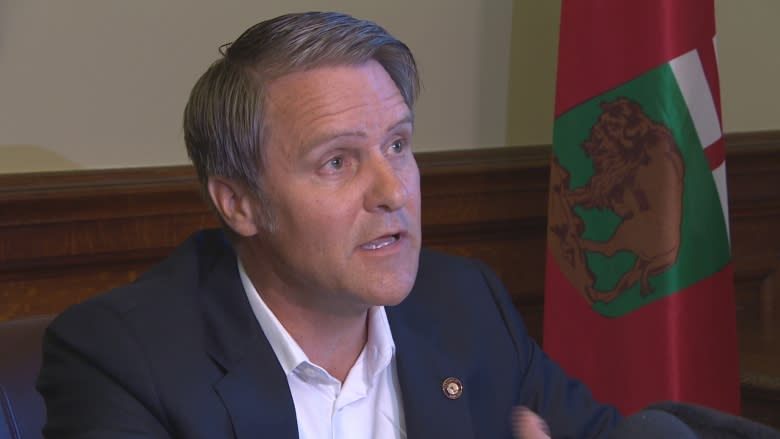PC finance minister blames NDP for latest provincial credit downgrade

Progressive Conservative Finance Minister Cameron Friesen says Manitoba's former NDP government is to blame for the province's latest credit downgrade.
On Thursday, credit-rating agency S&P Global Ratings downgraded Manitoba's credit rating to AA-minus from AA because it expects the province to have a debt burden for years to come, will have trouble balancing its budget and only has a two-in-three chance of meeting its current financial targets.
On Friday, Friesen told reporters the Selinger government is to blame because it routinely failed to meet its own fiscal targets and ignored warnings from credit-rating agencies to get its fiscal house in order.
"Certainly this is not a house-on-fire scenario, but it's not good news for the province right now," Friesen said of the S&P downgrade during a press conference in his office at the Manitoba Legislature.
"We want to move in the right direction. Our predecessors did not. What Manitobans are looking for is a government that gives a clear direction of what it's doing, where it's going and then takes steps to meet its targets."
On budget day in May, Friesen presented a plan to post a $911-million deficit at the end of the 2016-17 fiscal year, which is down from a projected 2015-16 deficit of $1.011 billion. The former Selinger government expected the 2015-16 deficit to be $422 million.
The province's accumulated debt, meanwhile, is estimated at $21.9 billion. As a result, Manitoba spends about $850 million every year to service that debt, Friesen said.
He declined to speculate what effect the S&P downgrade would have on the cost of borrowing, debt-service payments or Canadian provincial bond spreads, which are the difference in bond yields for provinces with different credit ratings.
"It is uncertain right now what the effect of this downgrade will be," said Friesen, saying that he is nonetheless concerned about the potential for additional debt-servicing costs.
"We have to understand that $850 million every year towards debt servicing costs is a lot and any additional amounts spent on that is money that can not go to frontline services."
Friesen also declined to speculate what credit-rating agencies Moody's or DBRS will do in the wake of S&P's decision.
He said although he met in Toronto with S&P, he rejects the notion the downgrade reflects upon the Pallister government's performance.
"I don't think Manitobans would suggest that somehow a decision undertaken yesterday by a credit-rating agency would reflect on a government that's been in power less than three months," Friesen said.
He said the NDP are to blame for both the S&P downgrade and a previous downgrade by Moody's last summer. Moody's first warned the Selinger government to get its house in order in 2014, he said.
"Manitobans must recognize the decision taken yesterday by S&P reflects on the previous NDP government's inability to meet their own fiscal targets," he said.
"We know it is a government that overspent its planned budget each and every year. Clearly the message from the credit rating agency is meeting your budget targets matters greatly."
Manitoba interim NDP leader Flor Marcelino rejected the finance minister's assertions.
"Maybe Mr. Friesen forgot our government incurred a huge deficit because of the 2011 flood and then we had the 2014 floods and we had to respond to those emergencies," she said in her office.
"Would we rather leave all those victims of floods — never mind, don't do anything to mitigate the situation - just to maintain a balanced budget? Of course not. That's foolhardy. We responded to the needs of the people and the needs of the community."
Friesen said his government has hired consulting firm KPMG to conduct a value-for-money review of the province's spending. The $740,000 review will begin in days, he said.
The province is also engaging in a health-spending review and a red-tape review and has started tightening its fiscal belt, he said.
The Tories do not, however, plan to balance Manitoba's budget until their second term, which would begin in 2020 if they are re-elected.
Michael Benarroch, dean of the Asper School of Business at the University of Manitoba, said it's accurate for Friesen to say the PCs inherited a fiscal mess from the NDP.
Benarroch said he doesn't expect the credit downgrade to affect Manitoba's finances immediately.
While interest rates are low right now, when they go up, incrementally higher rates will lead to more accumulated debt, which "could become a problem in the future for Manitoba."


